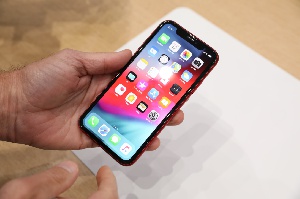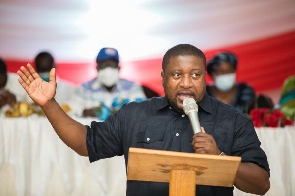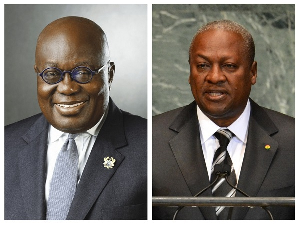Some people survive on their faiths, values and beliefs. These are inner part of human existence that cannot be physically evaluated and assessed in as far as the contributions of those faiths, values and beliefs contribute to their physical wellbeing and provisions of their material and physical needs. These are more prevalent in Africa and some parts of Asia than in the developed Western countries. Strangely, those of us in Africa and Asia who have serious attachments to our religious faiths, values and beliefs are materially poorer than those in the Western developed countries.
Perhaps those faiths, values and beliefs found in Africa and most parts of Asia place more importance on those spiritual values than the physical and material needs of the human being. In Ghana for example, the two main religious groupings – Christians and Muslims – tend to associate everything to their faith. To the Christian, even poverty is the will of God. To the Muslim, death, no matter how it happens, is designed by Allah to happen.
To the traditionalist, every death of suspicious character is caused by someone spiritually and that they use their own means of finding who was responsible for the death of the person. To them, young children have no reason to die in their early stages of life. In many instances, Christians and Muslims, when it comes to issues of death of family members and relations, it is the work of God or Allah, no matter what.
I would like to share with you a documentary I watched on Aljazeera TV network a couple of days ago. Let us look at the narration, the outcomes and benefits to society and compare them to our situations as Christians, Muslims and the tiny traditionalists in our society.
Yumi Hwan was a young lady who worked for Samsung Company in a town – an hour's drive from Seoul – the capital of South Korea. She worked at the department that produced semi-conductors. She worked for a number of years and all of a sudden, she fell ill. Her father, Mr. Hwan, and his wife took their daughter to all the best hospitals they could find in their area but the conditions of her daughter continued to deteriorate. She lost hairs and grew lean by the day; neither could she eat nor sleep.
The father persisted to have a cure for the daughter until he was called aside during one visit to a hospital by a doctor that his child was suffering from leukemia. The young lady died in 2007. The father promised her dead daughter that he would not rest until he finds the cause and source of the leukemia. He engaged in a one-man crusade. He visited the homes of late Samsung workers who suffered long illnesses before their death.
He investigated the causes of their deaths; he visited ex-employees of Samsung who had been dismissed because of their health conditions and are either bedridden or paralyzed and were in wheels. He came to the conclusion that those deaths and ailments were from Samsung. He began a one-man protest on the premises of Samsung on a daily basis. With time, some relatives of dead ex- workers of Samsung joined him.
The numbers swelled, the shouts became louder and many passers-by paid attention to what was happening. They took public signatures on the issue and thousands signed and joined the protest. KComwel – the equivalence of Ghana's Trade Union Congress (TUC) – came in to receive their petitions. The South Korean Ministry of Employment and Labour came in and helped with the investigations but said in 2012 that there was no correlation between the illness of the ex- employees of Samsung and the company.
The group never relented but went ahead with their agitations and belief that the illnesses and deaths certainly had something to do with Samsung. In 2014, however, Samsung made a veiled admission and apologized to the ex-staff and agreed to pay compensations to the victims and their relatives. As at the time the documentary was aired, negotiations for the compensations were still ongoing. In fact, Samsung promised to improve workplace conditions and environment to protect workers.
What lessons do we learn from the crusade of Mr. Hwang in this narration? He just did not do what he did for the sake of achieving huge compensations from this giant company to its ex-employees who were being treated like disposable objects, used and dumped in the process of selling their labour to their employers, but the fact that future young South Korean workers of the company would have a better and safer working environment should qualify him to have the highest honour in his country. He did blame God for the death of his child.
In Ghana, if an individual insists on doing what Mr. Hwang did in South Korea, he or she will be tagged as 'too know', socially ostracized and politically seen as a threat to national security and stability.
Now, back to the belief systems that operate in Africa as a whole and Ghana in particular. That I am in my home, a reckless driver drives into my poor house and kills my family member, should I consider that it was the will of God or Allah? That an irresponsible health practitioner administers the wrong prescription to me and I die after taking the medication, should anyone consider that as the will of God? We live in very filthy environments created by ourselves, and children die out of mosquito bites at ages below five years then we take consolation in the belief that 'it is God who gives and it is God who takes”. How?
Such thoughts and beliefs will not make you identify the fact that it is the filthy environment in which you live that bred the mosquitoes which killed the child. We learn no lessons from them to influence our lifestyles in terms of cleanliness and our children keep on dying and we continue to take solace in the belief that it was God's will that those children die at those tender ages.
Concerning the recent occurrences at Adenta and Madina – both in the greater Accra Region – the lives lost cannot in a way be considered as the will of God or Allah. It is simply that public servants and officers employed and paid by the State failed to do what they are supposed to do. Their deaths were the results of human negligence and indifference to the plight and needs of others. This nation loses thousands of lives needlessly each year as a result of human errors and no one seems to care because it is the wish of God or Allah that they die the way they died. Amazing!
Yes, people, society, a nation must have its set of beliefs and values to govern their lives, but they should not be permanently enslaved by those values and beliefs in the face of changing conditions all around them. Beliefs and value systems that do not engender progress in human lives in the face of changing situations do not help human growth and development.
We have allowed incompetent public servants and office holders to inflict so many pains unto individuals and families and gotten away with it because we believe that their actions and inaction which might have led to catastrophic consequences were spiritually ordained and as a result we have no cause to complain since it is the wish of God or Allah. This country will only see progress and development through change of our attitudes, ways of life, and mindsets as individuals. Static and dogmatic approach to ways of doing things will always keep us backward.
May the souls of the departed ones on the Adenta-Madina highways rest in peace. It was certainly not the wish of God or Allah; it was the inconsiderate actions of those who are entrusted to play certain roles but failed to do what they are paid to do.
Kb2014@gmail.com
By Kwesi Biney











